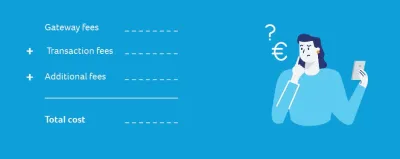What are the costs associated with accept online payments?

When you start selling online, you may have costs associated with setting up and using your website, such as web design and development, hosting, plugins, and shopping cart software. And when your shop is up-and-running, there are also some fees for accepting online payments. In this article we go in-depth and explain which costs are related with accepting online payments.
Online payment costs vary depending on the type of transaction, the volume of transactions, gateway fees, and processing fees. With some providers, (note: not CCV!) you may be asked to pay a one-time setup fee to the Payment Service Provider (PSP), depending on the length and terms of the agreement.
We can’t tell you exactly how much it will cost to accept online payment, because it differs from business to business depending on your online payment infrastructure.
However, this is what you should consider about the costs of accepting online payment:
• Gateway fees: The gateway fee is charged by the PSP for taking care of the technical part of the transaction, much like what happens with a physical terminal in a store. This might be a fixed monthly fee and/or a fixed (or variable) fee per transaction.
• Transaction fees: Every time a merchant receives a payment, they’re charged a small percentage of the transaction’s value to cover the costs of the multiple parties involved. This can vary based on the type of transaction (e.g. credit cards are more expensive to process than debit cards) and the volume of transactions (often, the more you sell, the cheaper your rates). These transaction fees are charged by the acquiring bank – either directly, or via your PSP.
• Additional fees: Depending on the merchant’s agreement with their provider, they may also be liable for fees related to refunds, chargebacks, early cancellations, or security.

Want to learn more about our Online Payment solutions?